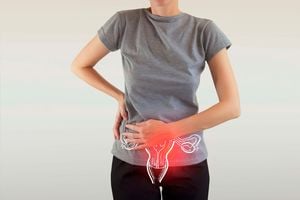Why some women don't ovulate every month

Any conditions that affect hormone levels can make ovulation irregular or absent, including polycystic ovarian syndrome, thyroid disorders, other hormonal disorders, ovarian insufficiency, obesity, very low body weight, excessive stress or excessive exercise.
What you need to know:
- Ovulation happens when the ovary releases a mature egg as a result of hormonal and physical changes in the course of the menstrual cycle.
Doc,
Is it true that women don't ovulate every other cycle?
Dear reader,
Ovulation happens when the ovary releases a mature egg as a result of hormonal and physical changes in the course of the menstrual cycle. Normally, menstrual cycles are accompanied by ovulation with every cycle.
Ovulation may be irregular during the first few years after menstruation begins, during breastfeeding and in the last few years before menopause (perimenopause).
Any conditions that affect hormone levels can make ovulation irregular or absent, including polycystic ovarian syndrome, thyroid disorders, other hormonal disorders, ovarian insufficiency, obesity, very low body weight, excessive stress or excessive exercise. Also, using hormonal contraceptives affects ovulation.
What causes forgetfulness? I have been forgetting things in the recent past. For instance, I will be telling a story, and I cannot remember the names of people who I know too well. I am a 32-year-old man.
Dear reader,
It is normal to forget a few things here and there. It only becomes a problem if it is interfering with your day-to-day life. Forgetfulness may happen as a result of not getting enough sleep/rest, or if you are very busy or stressed. Having anxiety or depression can lead to forgetfulness, as can excessive alcohol intake.
If you have hypothyroidism because your thyroid gland is under-active, this can affect your memory either directly or by interfering with sleep or by being a cause of depression. In addition, any medication that has a side effect of being sedating or causing confusion can interfere with attention and memory such as some antidepressants, some anti-histamines and some medications to treat an overactive bladder.
When severe, memory loss may be a symptom of a neurological or brain disorder , for instance brain injury, stroke, brain tumour, dementia from different causes, brain inflammation from different causes; hypoxic brain injury following a period of reduced oxygen supply, and seizure disorders. Problems with memory can also develop as part of a brain condition (Wernicke-Korsakoff syndrome) that is caused by severe Vitamin B1 deficiency, which can be as a result of chronic alcoholism.
Some tips to manage the forgetfulness:
- Eat a healthy balanced diet rich in fruits, vegetables and whole grains
- Take adequate amounts of water and limit alcohol intake
- Daily physical exercise, which improves blood supply to the entire body, including the brain. Whenever possible, interact with nature.
- Practise sleep hygiene and get adequate sleep and rest
- Engage your mind – do things that challenge your mind both at work and for leisure such as reading, playing games, working on puzzles, among others. Socialise with others, which helps with engaging the mind and dealing with stress, anxiety and depression
- Organise – keep essential items in the same place that is easy to reach; declutter your space; organise information and use reminders - by using a notebook or an electronic planner. There are brain exercises for organising information in your mind so that its easier to remember such as associating a person’s name to a distinctive feature about them, practising memory retrieval, using mnemonics and word associations, among others.
- Limit distractions – focus on one thing at a time, both at work and with social/family interactions
- Take some time everyday to meditate and relax
- Manage any chronic illnesses that you may have and speak to your doctor about changing any medications that may be contributing to forgetfulness
If the forgetfulness is severe or if it persists despite all measures, then it is advisable for you to be reviewed by a health care professional to assess for any underlying illnesses and appropriate treatment.
Dear Doctor,
Is there treatment for hemorrhoids?
Dear reader,
Hemorrhoids, which are also known as piles, are blood vessels (veins) that protrude along the wall of the rectum and the anus. These blood vessels can easily get torn and bleed when passing stool. Sometimes the hemorrhoids are external, that is, they are on the outside of the anus, or they become visible when passing stool, and can be pushed back in. Internal hemorrhoids, on the other hand, are located higher in the rectum and are not readily visible, and may not be felt, but they still cause problems. Symptoms of hemorrhoids include bleeding when passing stool, pain and/or itching around the anus.
Hemorrhoids can develop as a result of constipation or diarrhoea, or as a consequence of anything that increases intra-abdominal pressure such as pregnancy, lifting weights, having a persistent cough, among others. Repeatedly standing or sitting for long is also a risk factor for developing hemorrhoids.
Most of the time, hemorrhoids resolve on their own without treatment. Some lifestyle changes to prevent or manage hemorrhoids include having a diet that is rich in fibre; taking adequate amounts of water; and regular exercise. For toilet habits, you can use a short stool to elevate your legs when passing stool; don’t be in a hurry when having a bowel movement; and wipe yourself gently with moistened tissue paper or wet wipes, or alternatively, wash the area then dry. You can take a sitz bath/sit in warm water for about 20min twice a day to soothe the area.
There are prescribed medications that can be given to control the bleeding ease the irritation and also soften the stool so as to avoid straining when passing stool. Severe symptoms such as persistent bleeding or pain, and large hemorrhoids can be removed through a surgical procedure. It is also advisable to check for any other underlying issues within the gastrointestinal tract.
Send your questions to [email protected]




